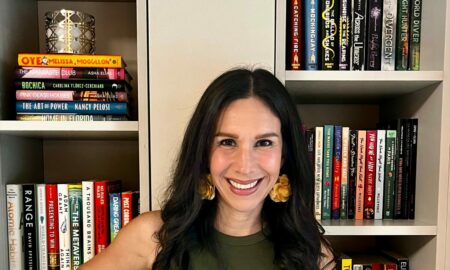

Today we’d like to introduce you to Shane Neman.
I pride myself on being a problem solver and a consummate optimist, which are traits that have been significant advantages in my life as a serial entrepreneur. I was born and raised in New York and lived most of my adult life in Manhattan before moving to Miami approximately six years ago with my wife and two children. My experience and expertise in business span many industries from technology and telecommunications to real estate and hospitality. After earning a computer science degree from NYU, I started three tech startups (two of them – EZ Texting and JoonBug – were acquired) with hundreds of employees and tens of thousands of customers. Today I run my own family office called Neman Ventures. I’m a prolific venture capitalist and backer of early-stage startups. I’ve also been a large real estate investor and developer for the past 20 years.
The road for me has been as bumpy as a turbulent plane ride through a hurricane. But every time there has been a close call where I thought I was going to crash and burn, I have thankfully come out relatively unscathed with a renewed sense of confidence and a higher level of emotional fortitude.
After college, I went to NYU Med School, where I realized within the first few months that my passion was more in Tech than Medicine. I had worked intensely hard through the Pre-Med track to ace my courses and MCAT scores, so throwing that all away was a daunting proposition. If I continued the course towards becoming a surgeon (what I was aiming for), I would have the stability of knowing that I will always have a great paying and challenging job – despite the fact that most doctors today are underpaid, underappreciated and overworked. I also had to face the prospect of letting down my family, friends and mentors that had helped me along the way. Finally, one Sunday evening I finished reading a chapter in Lippincott’s Biochemistry, put down the book, and called my mom and told her I wasn’t going to Med School anymore. She surprisingly and simply said, “Ok, I love you,” which was exactly what I needed to hear. Despite all my anxiety and fear about leaving something I had worked so hard for into the unknown, a week later, I was pulling all-nighters at Convey.com as their lead software engineer. I worked on developing one of the first blogging systems created even before the word “blog” was ever coined (we called it an online publishing system).
I eventually got back on my feet and started two new tech startups over the next decade: JoonBug and EzTexting. They both had their own struggles and growing pains as most businesses do. But then I hit a few major catastrophic moments while growing Ez Texting, which is a SaaS SMS messaging platform for SMBs (think Constant Contact or MailChimp for texting). At one point, our service was shut down by one of the four largest carriers, T-Mobile, from messaging their subscribers which essentially rendered our platform useless; it’s commensurate to buying a cell phone which can’t call or text anyone who’s phone number is on T-Mobile. It was a “David and Goliath” situation for me because I had unsuccessfully tried all diplomatic means to get through the bureaucracy of a multi-billion dollar company which saw my company as a mere pion. I quickly realized that I was in an urgent do-or-die situation and started my search for the best telecommunications litigation lawyer (who I potentially couldn’t even afford).
Thankfully I found one in DC, home of the FCC. My attorney Mike Hazzard Esq was able to file an emergency injunction in NY Federal Court for me that finally settled the situation and brought our service fully back up. Needless to say, I was relieved that Ez Texting would live on and eventually became the largest SMB SMS platform in the US now. But that wasn’t without a ton of sleepless all-nighters, a heavy unaffordable legal bill, and the emotional roller-coaster ride that puts extreme skydiving to shame.
Since then I have had a bunch more instances where I hit rocky roads in both my personal and business life, but from these experiences and many more like it, I have been able to get through them with more confidence and calm.
Currently, I run Neman Ventures, which is a Single Family office located in the MiMo district of Miami. We do all sorts of investments from Venture, Private Equity, Debt, and Real Estate. My Venture investments range from seed to late-stage companies in tech, prop-tech, consumer staples, apparel, and food. What sets us apart is that we don’t discriminate on good ideas based on industry, and since I have direct experience with my own previous companies, I personally help the founders of the startups as they go through various growing pains. Some examples of companies I am invested in includes Impossible Foods, Convoy, Prose, Universal Standard, Apostrophe, MeetMindful, MapAnything, VinePair, Smylen and most recently ResiDesk.
On the Private Equity side of the investments, we focus mainly on overlooked businesses or contrarian businesses that may be in a down-cycle; for example, I am currently looking at distressed assets in the energy space outside of the US. What’s unique about our approach is the contrarian stakes we take in the private companies and investing internationally.
Lastly, in terms of Real Estate investing and development, I own more than two dozen large-scale properties across the U.S. ranging from commercial shopping and industrial centers, traditional office buildings, cold storage facilities, student housing and residential buildings. We stand out by investing in a diversity of value-add properties in underserved or gentrifying neighborhoods where we can improve the types of tenants and the community over a longer time horizon.
With all that said, the single biggest factor I am most proud of as a company is still having the scrappy entrepreneurial spirit despite taking on many large-scale projects and investments. We don’t have a large team or fancy offices; in fact we work out of a co-working space. We are able to do this by leveraging software and technology to efficiently streamline our processes and automate most of the redundant tasks we have to do.
When it comes to business for me it’s not only how much return our investments make in terms of dollars but who around us benefitted as well. One of the major aspects I look for when doing an investment is what impact it’s going to have on the founders, employees, communities and others that support that particular project. If everyone can win then we are always on board, but if we win at the expense of others losing then that is not what we define as success.
In my personal life my success is measured by the amount of free time I can spend with my wife and two children. I’ve specifically tried to engineer my work to maximize my family time. Especially while my children are still young and not super busy with after school activities but not yet old enough to think it’s not cool to hang out with your parents! If I can drop my kids off at school in the morning and be home by 4/5 pm to spend the rest of the day with my family and (and even get a workout in), then I have achieved 99% of all my goals.
Contact Info:
- Website: www.shaneneman.com
- Instagram: https://www.instagram.com/shaneneman/
- Facebook: https://www.facebook.com/NemanVentures/
- Twitter: https://twitter.com/shaneneman








Suggest a story: VoyageMIA is built on recommendations from the community; it’s how we uncover hidden gems, so if you or someone you know deserves recognition please let us know here.

















